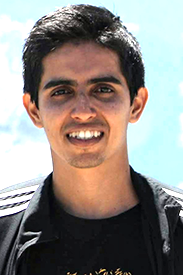Using funds from the National Science Foundation grant (under NSF’s TRIPODS and Convergence Programs), IFDS is funding five Research Assistants this semester to collaborate across departments on IFDS research. Each person is advised by one primary and one secondary adviser, all of them members of IFDS and all affiliated with the Wisconsin Institute for Discovery.
 Shashank Rajput (Computer Science), advised by Dimitris Papailiopoulos (Electrical and Computer Engineering) and Stephen Wright (Computer Science), works on problems in distributed machine learning and optimization. He works on developing techniques which are fast and scalable for practical use, and have theoretical guarantees. His current work is on designing faster optimization methods that take into account the system constraints and give theoretical guarantees for convergence rates. In particular, there can be cases where training examples sampled during the optimization are selected in a certain schedule. The goal of the project is to get schedule specific convergence rates, which will help in designing better optimization algorithms.
Shashank Rajput (Computer Science), advised by Dimitris Papailiopoulos (Electrical and Computer Engineering) and Stephen Wright (Computer Science), works on problems in distributed machine learning and optimization. He works on developing techniques which are fast and scalable for practical use, and have theoretical guarantees. His current work is on designing faster optimization methods that take into account the system constraints and give theoretical guarantees for convergence rates. In particular, there can be cases where training examples sampled during the optimization are selected in a certain schedule. The goal of the project is to get schedule specific convergence rates, which will help in designing better optimization algorithms.
 Ankit Pensia (Computer Science), advised by Po-Ling Loh (Statistics) and Varun Jog (Electrical and Computer Engineering) is working on projects in robust machine learning. His focus is on designing statistically and computationally efficient estimators that perform well even when the training data itself is corrupted. Traditional algorithms don’t perform well in the presence of noise: they are either slow or incur large error. As the data today is high-dimensional and usually corrupted, a better understanding of fast and robust algorithms would lead to better performance in scientific and practical applications.
Ankit Pensia (Computer Science), advised by Po-Ling Loh (Statistics) and Varun Jog (Electrical and Computer Engineering) is working on projects in robust machine learning. His focus is on designing statistically and computationally efficient estimators that perform well even when the training data itself is corrupted. Traditional algorithms don’t perform well in the presence of noise: they are either slow or incur large error. As the data today is high-dimensional and usually corrupted, a better understanding of fast and robust algorithms would lead to better performance in scientific and practical applications.
 Brandon Legried (Mathematics), advised by Sebastien Roch and working with Cecile Ane (Botany and Statistics), is working on mathematical statistics with applications to computational biology. He is studying evolutionary history, usually depicted with a tree. As an inference problem, it is interesting to view extant species information as observed data and reconstruct tree topologies or states of evolving features (such as a DNA sequence). We look to achieve results that extend across many model assumptions. The mathematical challenges involved lie at the intersection of probability and optimization.
Brandon Legried (Mathematics), advised by Sebastien Roch and working with Cecile Ane (Botany and Statistics), is working on mathematical statistics with applications to computational biology. He is studying evolutionary history, usually depicted with a tree. As an inference problem, it is interesting to view extant species information as observed data and reconstruct tree topologies or states of evolving features (such as a DNA sequence). We look to achieve results that extend across many model assumptions. The mathematical challenges involved lie at the intersection of probability and optimization.
 Lorenzo Najt (Mathematics), advised by Jordan Ellenberg (Math), investigates algorithmic and inferential questions related to ensemble analysis of gerrymandering. Related to this, he is interested in complexity theory questions related to sampling from connected graph partitions, and is working with Michael Newton (Statistics) to investigate applications of such samplers to hypothesis testing with spatial data.
Lorenzo Najt (Mathematics), advised by Jordan Ellenberg (Math), investigates algorithmic and inferential questions related to ensemble analysis of gerrymandering. Related to this, he is interested in complexity theory questions related to sampling from connected graph partitions, and is working with Michael Newton (Statistics) to investigate applications of such samplers to hypothesis testing with spatial data.
 Yiding Chen (Computer Sciences), advised by Jerry Zhu (Computer Sciences) and collaborating with Po-ling Loh (Electrical and Computer Engineering), is doing research on adversarial machine learning and robust machine learning. In particular, he focuses on robust learning in high dimension. He is also interested in the intersection of adversarial machine learning and control theory.
Yiding Chen (Computer Sciences), advised by Jerry Zhu (Computer Sciences) and collaborating with Po-ling Loh (Electrical and Computer Engineering), is doing research on adversarial machine learning and robust machine learning. In particular, he focuses on robust learning in high dimension. He is also interested in the intersection of adversarial machine learning and control theory.
